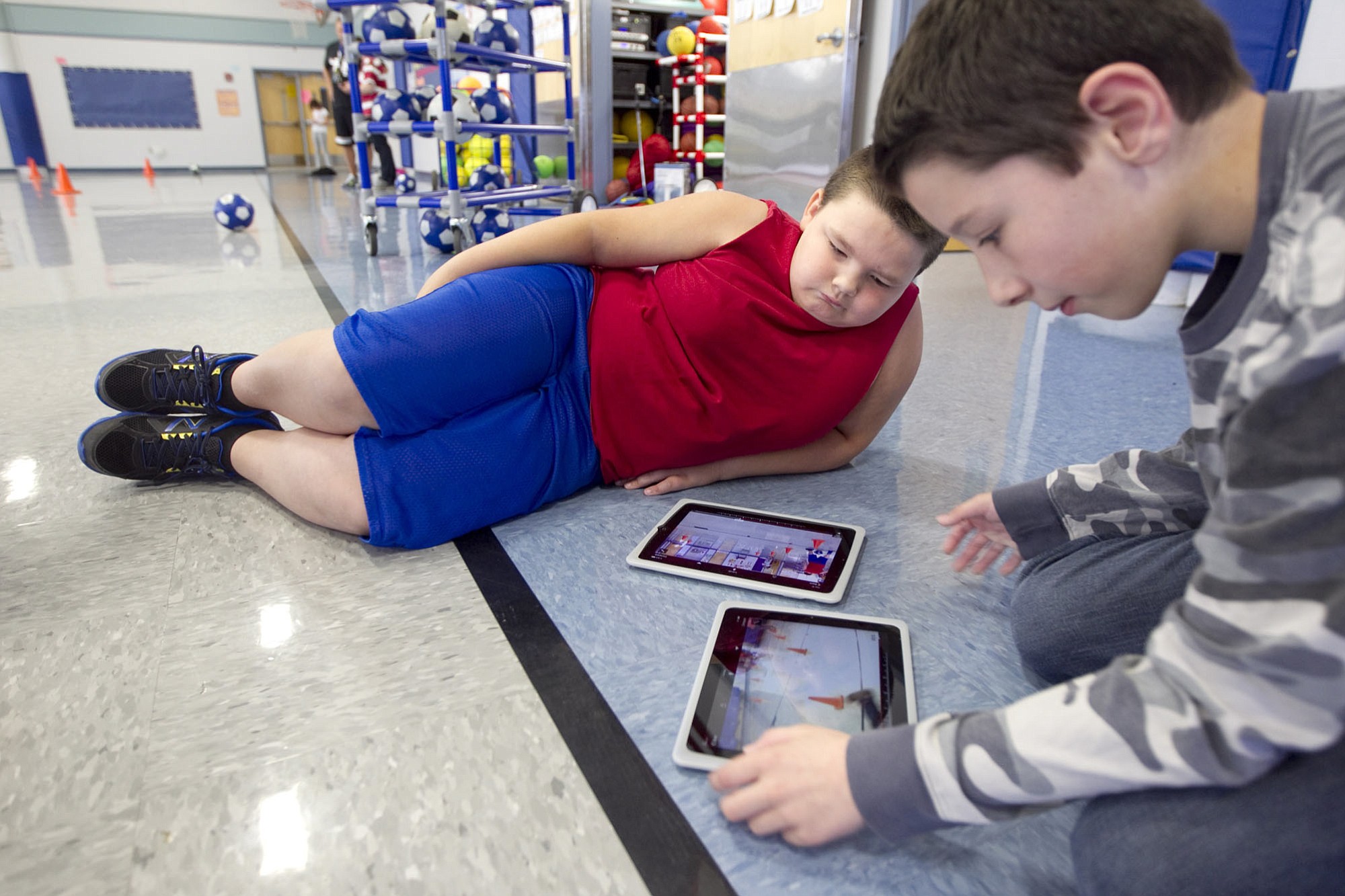Tiffany McCormick picked up a student’s world history textbook and flipped to the publication date: 2001. By now, the book itself seems like ancient history.
The sixth-grade language arts and history teacher at Washougal’s Canyon Creek Middle School finds her class moving further away from their textbooks and gravitating toward their Apple iPads instead. The tablet computers have opened the class to a world of changing information.
“The iPad has gotten us up to date with what’s going on in the world,” McCormick said. “We barely use the book anymore. We’re basically phasing it out.”
McCormick is one of hundreds of teachers throughout Clark County who have introduced tablets, Chromebooks or other Internet-enabled devices into their lessons. Rather than using an outdated textbook written for a national audience, interactive ebooks and other curriculum are being tailored for school districts, and even can be adapted for an individual student. New software apps make it possible for students to explore subjects in depth in ways not possible with a textbook.
Only a few years after being introduced, tablets and mobile computing devices are revolutionizing public schools here and across the U.S. at a cost of millions of dollars. Teachers say it’s worth it, as more and more software is developed to enrich curriculum.
Even so, educators realize the devices are not a panacea.
Ridgefield Superintendent Nathan McCann said he’s wary about incurring big expenses to fully replace books with electronic devices, especially if it doesn’t clearly enhance the learning process.
“The most important thing that I would be most concerned about whenever we’re thinking about technology is, fundamentally, is it doing something to change the teaching and learning that’s going on in the classroom,” McCann said. “If it’s not, you can replicate everything on pen and paper.”
But evidence suggests the revolution is here.
Deeper level
Vancouver and Evergreen plan to put a device in the hands of each student — 49,000 in all.
Washougal plans to do the same, said Les Brown, Washougal’s technology director. This year, the district is spending about $280,000 on iPads, charging carts and covers. The costs are expected to more than double in the next few years.
Teachers with tablets realized they could offer students more research opportunities, Brown said.
Pete Forgey, an eighth grade social studies teacher at Canyon Creek, began incorporating the tablets into his classes this year. Now, in his 39th year of teaching, Forgey said iPads have given his students a chance to engage with the material on a deeper level.
“It is a completely different way of teaching,” he said.
Instead of just reading about history in textbooks, Forgey’s students browse the Web and use apps to get a closer look. For a recent unit on Colonial Jamestown, Forgey’s students took a virtual tour of archaeological digs via their iPads.
Mark Bauer, a physical education teacher at Washougal’s Gause Elementary, uses the tablets in his class to improve the learning process. An app called Ubersense allows his fifth-grade students to record each other doing soccer skill drills and to replay their videos in slow motion so they can analyze their form.
“What I’m trying to do is give them an opportunity to look at their skills themselves,” he said. “I can tell them what they’re doing wrong or what they’re doing correctly, but, hopefully, by using Ubersense and a rubric, they can kind of take more control over their own learning.”
In that same vein, the Air Force Junior ROTC students at Prairie High School in Battle Ground use iPads to record their drills. Student cadets review the footage and determine how they can improve. Cadets maintain a private Facebook page so they can review their videos.
“There’s something about seeing video of your position to get your movements down,” said Cadet Captain Taylor Harper, 17, a senior. “There’s also an app that’s a metronome that keeps us in cadence and step. We plug the iPad into a portable speaker.”
Additional help
Educators are using the devices and software to assist students who might need additional help.
Ridgefield has created an extensive iPad program for students with learning disabilities, McCann said. Those who struggle with motor skills tend to use touch screen technology easier than a keyboard.
Students who enter Amy Matsumoto’s English language development class at Wy’east Middle School in the Evergreen school district are recent immigrants who hail from all over the globe and speak many languages. But not English.
The 10 iPads she received via a grant have helped her students to hear the English words they are struggling to understand.
“Before, the students were extremely dependent on me,” Matsumoto said. “They asked me, ‘What is this word? How do you say it?’ When they’re reading an iBook, they can hear the word and get the definition.”
When Christia Salmo, 13, emigrated from Syria last fall, she didn’t speak a word of English. She credits iPad apps MobyMax and Zantl for helping her learn the language so quickly.
At home, Christia said she used the apps on her family’s computer to help her mother and brother improve their English skills.
Tablet or laptop?
Some districts are purchasing Apple’s iPads for their students, while others are choosing Chromebook laptop computers which are more cost-effective and have a keyboard.
“We’re in an age when one tool does not satisfy all the needs,” said Scott McDaniel, director of technology for Battle Ground Public Schools. “People in the past used to think that compatibility is king. It’s more of a requirement now that a computer user is savvy and makes constant decisions about the best way to work.”
This fall, Battle Ground’s technology department delivered carts filled with Chromebook computers — 2,400 in al l— to every school in the district, evenly distributed among primary, middle and high schools, said McDaniel. The mobile device looks like a lightweight laptop, but it is used specifically to work online or in the Cloud through the district’s secure network. The Chromebooks are stored in rolling carts that each hold 30 devices and keep them charged. Teachers will be able to reserve and check out the mobile devices.
Evergreen Public Schools is moving forward with technology pilot programs, and plans to put devices in each student’s hands within three years, said John Steach, deputy superintendent. Steach referred to the new technology as “the ultimate Swiss Army Knife, giving teachers the tools they need to do so many things.”
Before teachers can teach with the technology, they have to learn it. To bridge that knowledge gap, Battle Ground has organized The Academy. One teacher from each school attends Academy workshops where teachers share ideas and best practices and then take that knowledge back to the teachers in their buildings.
Creating iBooks
After voters approved a $24 million technology levy in February 2013, Vancouver Public Schools has moved forward with 1:1 technology. That means the district plans to provide one electronic device per student.
What’s most cutting-edge about Vancouver’s approach is that last year, teachers developed an interactive iBook for seventh grade social studies. It has a Southwest Washington focus and uses primary source documents including video footage of the Columbia River dam system and the Kaiser Shipyards. Students will begin using the new iBook this month.
“We thought as long as we’re rolling out the iPads, it would be fun to develop an iBook that would allow kids to practice the inquiry method of learning,” said Kathy Wolfley, curriculum specialist for K-12 social studies for the district. “Capitalize on their curiosity. Give them engaging questions. Encourage them to develop their own questions and do further research. It fit nicely with the iPads in their hands.”
Next, Wolfley is exploring the possibility of teachers creating an iBook for eighth-grade U.S. history.
World of curriculum
With schools widely using tablets and other electronic devices, publishers and institutions have begun releasing interactive ebooks and other curricula for those devices. Some have a hefty price tag, but many are free.
The Library of Congress rolled out its free, interactive Student Discovery series of six ebooks for tablets on Sept. 15. The ebooks use the library’s wealth of primary source collections, which allow students to zoom in on the faces of emigrants at Ellis Island, Galileo’s drawings of the moon or George Washington’s notes on the Constitution.
“Primary sources are the raw materials of history, and analyzing these historical artifacts can help students engage with complex subjects, build critical-thinking skills and create new knowledge,” said Stephen Wesson, an educational resource specialist who helped develop the interactive ebooks at the Library of Congress.
Many other institutions — from The Smithsonian Science Education Center to the NASA — are releasing interactive educational curricula at no cost to schools. As the availability of rich educational materials proliferates, what and how students learn will continue to reach new heights.





